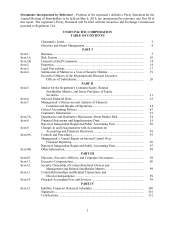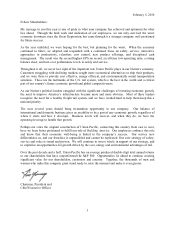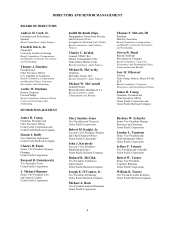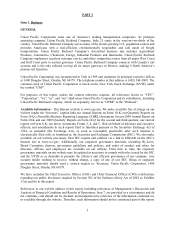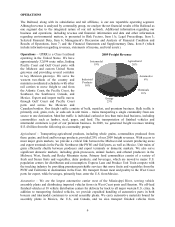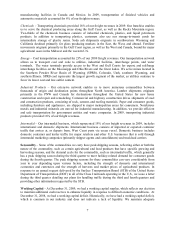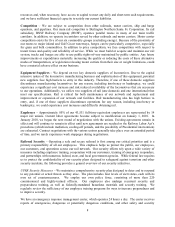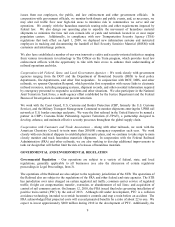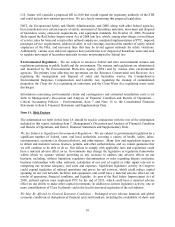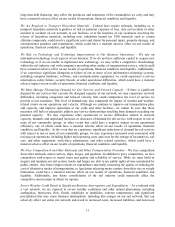Union Pacific 2009 Annual Report Download - page 12
Download and view the complete annual report
Please find page 12 of the 2009 Union Pacific annual report below. You can navigate through the pages in the report by either clicking on the pages listed below, or by using the keyword search tool below to find specific information within the annual report.12
revenue, which could have a material adverse effect on our results of operations, financial condition, and
liquidity.
Strikes or Work Stoppages Could Adversely Affect Our Operations as the Majority of Our Employees
Belong to Labor Unions and Labor Agreements – The U.S. Class I railroads are party to collective
bargaining agreements with various labor unions. Disputes with regard to the terms of these agreements
or our potential inability to negotiate acceptable contracts with these unions could result in, among other
things, strikes, work stoppages, or other slowdowns by the affected workers. If unionized workers were to
engage in a strike, work stoppage, or other slowdown, or other employees were to become unionized, we
could experience a significant disruption of our operations or higher ongoing labor costs, either of which
could have a material adverse effect on our results of operations, financial condition, and liquidity.
Additionally, future national labor agreements, or renegotiation of labor agreements or provisions of labor
agreements, could compromise our service reliability and significantly increase our costs for healthcare,
wages, and other benefits, which could have a material adverse impact on our results of operations,
financial condition, and liquidity.
We May Be Subject to Various Claims and Lawsuits That Could Result in Significant Expenditures – As a
railroad with operations in densely populated urban areas and other cities and a vast rail network, we are
exposed to the potential for various claims and litigation related to labor and employment, personal
injury, property damage, environmental liability, and other matters. Any material changes to litigation
trends or a catastrophic rail accident or series of accidents involving any or all of property damage,
personal injury, and environmental liability could have a material adverse effect on our results of
operations, financial condition, and liquidity.
We Are Subject to Significant Environmental Laws and Regulations – Due to the nature of the railroad
business, our operations are subject to extensive federal, state, and local environmental laws and
regulations concerning, among other things, emissions to the air; discharges to waters; handling, stora ge,
transportation, and disposal of waste and other materials; and hazardous material or petroleum releases.
We generate and transport hazardous and non-hazardous waste in our operations, and we did so in our
former operations. Environmental liability can extend to previously owned or operated properties, leased
properties, and properties owned by third parties, as well as to properties we currently own.
Environmental liabilities have arisen and may also arise from claims asserted by adjacent landowners or
other third parties in toxic tort litigation. We have been and may be subject to allegations or findings that
we have violated, or are strictly liable under, these laws or regulations. We could incur significant costs as
a result of any of the foregoing, and we may be required to incur significant expenses to investigate and
remediate known, unknown, or future environmental contamination, which could have a material adverse
effect on our results of operations, financial condition, and liquidity.
We May Be Affected by Climate Change and Market or Regulatory Responses to Climate Change –
Climate change, including the impact of global warming, could have a material adverse effect on our
results of operations, financial condition, and liquidity. Restrictions, caps, taxes, or other controls on
emissions of greenhouse gasses, including diesel exhaust, could significantly increase our operating costs.
Restrictions on emissions could also affect our customers that (a) use commodities that we carry to
produce energy, (b) use significant amounts of energy in producing or delivering the commodities we
carry, or (c) manufacture or produce goods that consume significant amounts of energy or burn fossil
fuels, including chemical producers, farmers and food producers, and automakers and other
manufacturers. Significant cost increases, government regulation, or changes of consumer preferences for
goods or services relating to alternative sources of energy or emissions reductions could materially affect
the markets for the commodities we carry, which in turn could have a material adverse effect on our
results of operations, financial condition, and liquidity. Government incentives encouraging the use of
alternative sources of energy could also affect certain of our customers and the markets for certain of the
commodities we carry in an unpredictable manner that could alter our traffic patterns, including, for
example, the impacts of ethanol incentives on farming and ethanol producers. Finally, we could face


